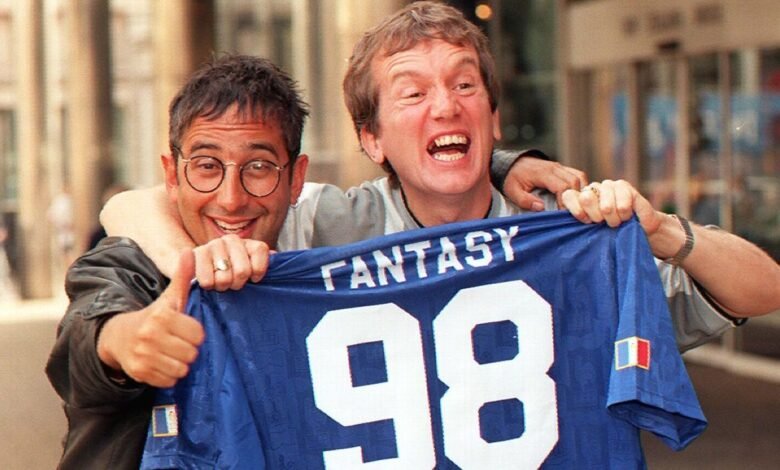How Fantasy Premier League went from niche to mainstream

[ad_1]
Picture the scene; you are doing all your Fantasy Premier League staff choice on the final minute on a Friday afternoon, and also you’re not sure whether or not your star striker goes to be match for his facet’s match on Saturday. There’s only one downside: you haven’t any method of verifying his health till Saturday’s newspapers are printed. And as an alternative of confirming your staff’s modifications with a swipe of your finger on an app, you will have to cellphone them in earlier than the deadline.
– Stream on ESPN+: LaLiga, Bundesliga, extra (US)
Desperate occasions name for determined measures. You contact the Premier League membership the striker performs for and fake to be a neighborhood journalist. Somehow you get by to the assistant supervisor, who tells you the ahead will likely be obtainable to play tomorrow. You name up the fantasy soccer firm and make sure your staff for that weekend with an individual on the opposite finish of the road, smug within the data you will have gained a bonus over your rivals.
If that appears like overkill — as a result of, properly, it’s — it is also proof of the dedication proven by fantasy soccer gamers within the sport’s early days within the UK The above story is actual — it occurred within the Nineties within the league of Tim Benson, a enterprise advisor, when a Liverpool striker was uncertain for the weekend.
That analogue model of fantasy soccer couldn’t be additional from at present’s official Premier League product, performed by nearly 11 million customers world wide, together with armchair pundits, chess grandmasters and top-flight gamers themselves. For the sport’s early adopters equivalent to Benson, nevertheless, the model the place pals held draft-style auctions for fantasy gamers in individual, phoned in or faxed their staff modifications and solely knew their whole factors the next Tuesday will all the time maintain a particular attract.
“A friend of mine said it summed it up perfectly when he was in his kitchen and a game was on,” Benson instructed ESPN. “He only realised how important the whole thing was to him when he [was] shouting out to his wife: ‘Who crossed the ball for a Wigan goal?’ … Nobody cares, but of course we care — because it matters.”
That will likely be a sense acquainted to many digital managers. With the Premier League prepared to kick off once more after the 2022 World Cup and followers turning their consideration again to their fantasy groups for the second half of the season, that is the story of how the sport first captured the creativeness of English followers — and paved the best way for the worldwide phenomenon it’s at present.
Magazines and fax machines: The starting of fantasy soccer
Long earlier than fantasy soccer began to make waves within the UK, its predecessors within the US had been massively profitable.
American sports activities followers wasted little time in tapping into the typical fan’s love of statistics. Bill Winkenbach, the part-owner of the NFL’s Oakland Raiders, arrange the primary fantasy gridiron league way back to 1962. Meanwhile, creator Dan Okrent created “rotisserie baseball” in 1980, a fantasy sport named after the Manhattan restaurant Le Rotisserie Francais, the place he and his pals would meet. But it was not till the Nineties that followers throughout the Atlantic really sat up and took discover.
Andrew Wainstein is the person extensively credited with having launched fantasy soccer to the UK Inspired by a fantasy baseball sport he was proven by a household good friend from the US, he realised soccer had but to take full benefit of statistics in the identical method as American sports activities. In 1991 — the 12 months earlier than the Premier League launched — he set about compiling a database of top-flight gamers, which might be used for a fantasy sport.
“The drive was just sort of enthusiasm for football,” mentioned Wainstein, who was a 25-year-old laptop programmer residing at residence on the time. “I was a massive football fan; it’s obviously by far and away the No. 1 sport in the UK and I just thought, ‘People are so opinionated about it and so passionate about it — the stats are maybe a bit basic, but it could work.'”
Wainstein was proper, though he performed no half within the official Premier League sport that has since taken over. With extra stats than ever earlier than, incentives equivalent to “Free Hit” tokens to maintain gamers and prizes, together with a seven-night break within the UK and a Hublot look ahead to the general winner, that model is a world away from the unique created by Wainstein.
It took Wainstein about 4 months to devise a factors scoring system for his sport, known as Fantasy League. Defenders and goalkeepers could be rewarded for clear sheets whereas objectives scored was one other straightforward metric, however Wainstein additionally launched the idea of assists — the go earlier than a aim is scored — following basketball’s instance.
– O’Hanlon: The 13 stats that specify the 2022 World Cup (E+)
Once Wainstein had settled on the sport’s format, he positioned ads in soccer magazines. Prospective gamers would ship off a subscription price and obtain an info pack with which to begin their league. The members of the brand new league would meet in individual — in pubs or convention rooms — to maintain an in-person public sale through which they might bid for top-flight gamers. Much like at present, the thought was to assemble a aggressive squad on a finances whereas figuring out which stars had been price forking out on.
Leagues would ship off their groups to Wainstein, who was then accountable for recording factors and updating sides with substitutions every week. Working out of his older sister’s bed room in Highgate, London, he usually discovered himself inundated with cellphone calls and faxes on a Friday afternoon as league directors known as in to verify groups earlier than that weekend’s deadline.
“From 12 ’til five o’clock on a Friday afternoon it was sort of nonstop, and then the fax as well — sometimes the fax would run out of paper so you’d run over and change the fax paper while you were on one or two phone calls,” Wainstein mentioned. “It was good fun — it was busy, but every call was generally a laugh, so I didn’t resent it.”
With no web and soccer stats few and much between, it was up to Wainstein to watch the video games on Match of the Day to establish which gamers had scored, supplied assists or contributed to clear sheets. Fantasy managers had to wait till Tuesday to obtain the up to date league tables, posted by Wainstein.
Fans purchased into the sport for skilled in addition to private causes. For Benson, it turned a method of interacting with potential purchasers and supplied a straightforward method into dialog that did not centre round enterprise.
“This way you can say: ‘Hello, how are you doing? I can’t believe you got a hat trick last week; I can’t believe you won again, I can’t believe you’re going to win the league or you’re going to finish last — and by the way, is there anything else?'” Benson mentioned.
Wainstein additionally seemed ahead to these conversations.
“The bit that I think was very magical about it was you got to speak to a lot of these people who were running leagues every Friday afternoon,” he mentioned. “Not only did they say, ‘Oh, how’s your week been?’ and ‘Oh god, my team’s bottom of the league,’ you’d also have this sort of banter around, ‘I’ve got these two players and I’ve got them on my bench and I can’t decide between them.'”
Fantasy soccer’s roaring success offers rise to the trendy sport
The sport proved to be a success. The first model within the 1991-92 season attracted about 600 to 700 gamers who had been a part of 80 leagues. But participation numbers actually began to take off when the sport was recurrently referred to on a brand new BBC Radio 5 Live present.
Wainstein labored with the Daily Telegraph newspaper to create the primary mass-market model in January 1994 and curiosity was stoked additional by the TV present, “Fantasy Football League,” introduced by comedians and future writers of England fan anthem “Three Lions,” David Baddiel and Frank Skinner — which featured a personality known as “Statto” within the mould of the sport’s creator, a job Wainstein turned down.
That proved to be a turning level as the sport’s recognition soared. Out of a complete circulation of about 900,000, Wainstein estimates that 350,000 of the Telegraph’s readers signed up to the paper’s model. According to Peter Suchet, the then-director of the Telegraph’s sports activities advertising division, the primary winner was a 14-year-old boy who received two tickets to any soccer match — he selected a cup last in Brazil.
– Ninan: How Carlsen positioned his method to FPL stardom
As Suchet says, those that took their soccer significantly had been rewarded — though some took it too significantly.
“I can remember in research one guy saying, ‘I go into my bedroom, I lock the door, I look at all the scores that the footballers in my team have made over the weekend … and I get really worked up,” Suchet mentioned. “I have imaginary conversations with them — I say to them, ‘You’re s—, I’m transferring you.’ “
Other newspapers took notice and began producing their very own variations — with some displaying extra effort than others — and there was one other sea change when Wainstein launched the primary on-line model of his sport in 1996. It meant followers not had to depend on cellphone traces or fax machines to push by substitutions — but it surely additionally signalled the top of the sport’s “magical” analogue days.
The Premier League adopted go well with, with its official model launching within the 2002-03 season. It is extra standard than ever now, and never simply amongst common followers: world chess champion Magnus Carlsen’s Twitter bio nonetheless boasts he’s a “Former (live) #1 Fantasy Premier League player,” whereas one web site claims to monitor the groups of Premier League stars, together with Bukayo Saka, James Maddison and Kalvin Phillips.
All digital managers will likely be confronted with the identical dilemmas following the World Cup break — will Erling Haaland decide up the place he left off having missed the event in Qatar? Should fantasy gamers use their wild card and swap up their total staff with many gamers fatigued after Qatar? And how to substitute Arsenal’s Gabriel Jesus following his knee harm throughout Brazil’s marketing campaign?
None of these questions would matter as a lot had been it not for the sport Wainstein created 31 years in the past — and which a lot of its early adopters have caught with regardless of the rise of the Premier League model. So, why has fantasy soccer been such a roaring success within the UK?
“It’s the nearest any young guy who loves football will get to managing a team,” Suchet mentioned. “They get lost in the romance of that game and they become managers for a moment in their lives — they’re managing their own team. It’s sad but true.”
[ad_2]
Source link





